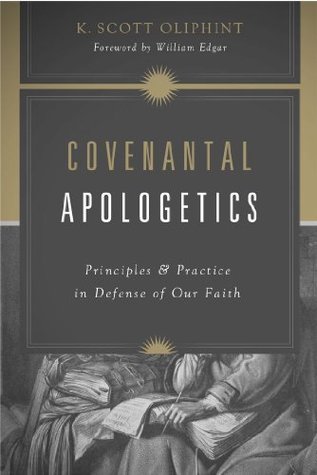More on this book
Community
Kindle Notes & Highlights
Read between
August 17 - September 19, 2013
What might be Dennett’s or Dawkins’s response to our dialog above? There is no way to tell, really. Perhaps each would mock us; maybe one would want to hear more about this; or maybe, just maybe, some such skeptic would join us and believe (Acts 17:32–34). No matter what the response, if the truth of God is set forth and defended, then our covenantal apologetic has been “successful,” at least from God’s perspective. And that perspective is the only one that counts in the end.
False religions are “Bizarro” religions. They depend on the real thing for their basic identity, but they twist and turn all of what is right in the true religion of Christianity and make it into something false, confused, and wicked. False religions take what Christianity has and use it for their own superstitious purposes.
We can imagine the reaction of the Athenians and philosophers there as Paul begins to speak. As soon as he says, “I perceive that in every way you are very religious,” the philosophers might begin a quiet inquiry among themselves: “What does Paul mean by ‘very religious’?” one of them might ask. “Does he mean to compliment us or is he criticizing us?” another might wonder. The use of the word itself, no doubt, gets their attention and arouses their religious and philosophical curiosity. They listen carefully in order to understand exactly what Paul means by “very religious.” Paul is a master
...more
It was a false statement because it referred to an illusion, a false god. But it became a true statement when biblical content was poured into it.
First, with Paul, we must be acutely aware of exactly who the god of the other religion is. Because other religions exist in order to avoid the true God, they will inevitably interject another god, and that god will have distinct characteristics. This is more difficult to recognize, for example, in Buddhism than in Islam, but it is useful if we can focus, first, on the doctrine of god on which the false religion depends. Second, it will help us to see how the false religion deals with its god’s relationship to creation. Whatever that relationship, every false religion will inevitably posit
...more
I don’t know what finally happened to Lawrence. The point of recounting this is to remind us that what anyone needs, and this includes those who have been deceived into other religions, is the gospel of Jesus Christ.
Had I been able to argue the fine points of Greek with Lawrence, I may have succeeded in showing him that I knew Greek better than he did—maybe even in showing him that his own translation of John 1:1 was questionable. But if I had discussed only that, I would have done him a disservice.
Moreover, God’s (necessary) character, as God, and his (contingent) relationship to creation are not at odds with each other. These two aspects of God’s character are not fighting against each other, but they are brought together and unified by God himself, specifically, by the Holy Spirit (again, think of the incarnation). So, in God, there is no contradiction or incompatibility between his character as God and his character as God with
The movement, therefore, from the contingent to the necessary is a movement that has its foundation in God’s movement from eternity to history; in
What I have proposed throughout this book are principles and practices of a covenantal apologetic.
If persuasion is the means by which we are to defend the Christian faith, then this requires, in the end, that we must be people who pursue holiness, without which no one will see the Lord (Heb. 12:14). It means, in the first place, that we cannot expect to imbibe the spirit of the age and at the same time to present a credible defense of Christianity. This is the ethos of persuasion, and we have not given that central and crucial factor its due in this book. This lack of attention should not, however, take away from its necessary role in apologetics.
One of Van Til’s favorite phrases was that we are to be suaviter in modo, fortiter in re—mild in manner, strong in matter.
The real question to ask is, are you for the Lord or are you for his adversaries? When we defend the faith against opponents of Christianity, the opposition, we must always remind ourselves, is against Christ and his Word, not mainly against us.


